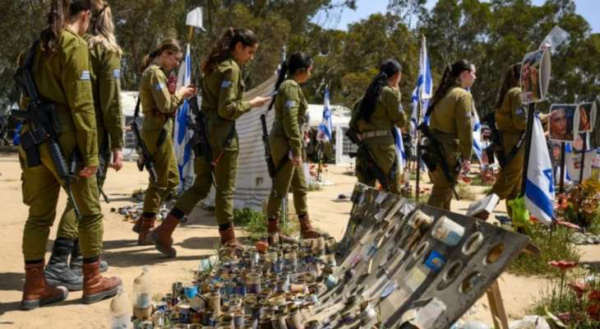Israeli Army Field Spotters Put on Trial for Abandoning Equipment While Escaping Missile Attack
The soldiers say they were instructed by commanders to leave the equipment behind when their outpost in northern Israel was targeted by anti-tank missile fire from Lebanon. The equipment included helmets, flak jackets and kitbags
Israeli soldiers who were evacuated from a northern outpost targeted by anti-tank missiles at the start of the war were put on trial for abandoning military equipment.
The women soldiers, who serve as field spotters, say they were instructed by their commanders to leave the equipment behind when they were forced to leave.
The equipment included helmets, flak jackets, kitbags and extensive personal property. The soldiers said that most of the equipment was burned in the shelling or was taken by other forces that took over the outpost after they left it.
The army argues that this is a routine procedure for recovering lost equipment, and the orders prescribe a disciplinary hearing for any case of lost military equipment. It added that most of the soldiers were acquitted, but some of the field observers were reprimanded and one was fined.
One of the soldiers tried complained about the indictment and that the army did not compensate them for the personal property that was lost during and after the evacuation. She said that she and her comrades were posted at the base for a full two-year service and therefore brought with them personal property worth thousands of shekels, which was lost.
“It’s unacceptable that the IDF does not recognize that we were forced to abandon the equipment there,” she said. “I shouldn’t have to pay for this out of my own pocket. The IDF knows how to demand money from us for military equipment, but why is no one refunding our money?” The army says that some of the soldiers lost the equipment after or before the base was evacuated, and that no complaints would be put in their personnel files.
The soldiers’ parents are furious that they were put on trial. One of them told Haaretz, “This is war. They should never have been put on trial, they were under missile attack.” He said that the company and battalion commanders were appointed after the incident, “and they judged the girls without knowing what had happened at all.”
The parents also asked the IDF to evacuate their daughters from the border zone for fear that the outposts would be hit, as happened on October 7 to the women field observers at the Nahal Oz outpost near the Gaza Strip border. One soldier said, “every time I open my mouth, I’m told, ‘Say thanks that you’re alive’. Even when we raised the subject in our conversations with the battalion commander, he told me, ‘Had you been in Gaza, you’d speak differently’.”
The IDF said in response, “as part of the process of supplementing missing equipment, IDF orders prescribe a disciplinary hearing. All soldiers were acquitted and were not penalized or required to pay compensation, except in a few specific cases that deviated from the orders.”
The IDF said in response, “as part of the process of supplementing missing equipment, IDF orders prescribe a disciplinary hearing. All soldiers were acquitted and were not penalized or required to pay compensation, except in a few specific cases that deviated from the orders.”
“The soldiers and commanders of the unit were given the opportunity to go in a safe and controlled manner to collect their personal property and military equipment that had been left at the base. They were also allowed and are still allowed to file requests for reimbursement. Every request will be examined as applicable. The battalion commander spokes with the servicewomen to hone all the issues and he will continue to pay vigorous attention to the service quality and experience.”
“The soldiers and commanders of the unit were given the opportunity to go in a safe and controlled manner to collect their personal property and military equipment that had been left at the base. They were also allowed and are still allowed to file requests for reimbursement. Every request will be examined as applicable. The battalion commander spokes with the servicewomen to hone all the issues and he will continue to pay vigorous attention to the service quality and experience.”
Haaretz


Leave a Reply
You must be logged in to post a comment.